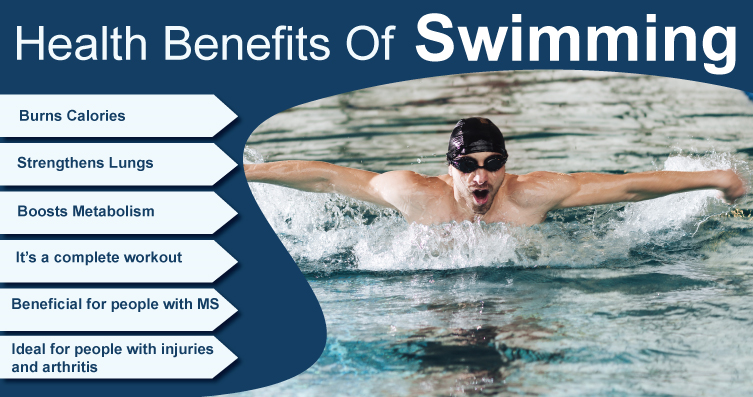Health
Benefits of Swimming

1. It’s a Complete Workout
Swimming, regardless of stroke or style, is a fantastic way to shape your body even if you don't engage in any other type of exercise.
Swimming engages more of the body's major muscle groups than other cardiovascular exercises. The top benefit of swimming is that it helps you strengthen your muscles, tones your body, and enhances your overall fitness.
2. Boosts
Metabolism
Swimming improves blood circulation, increases white blood cell count, and stimulates the immune system. It strengthens your heart and maintains blood circulating to your cells and organs, lowering inflammation and supporting the function of your immune system. The more time you spend in the pool, the more likely you are to improve your immune system's performance.
3. Ideal for People with Injuries and Arthritis
It is not always possible for people with disabilities or injuries to participate in physical activities or exercise. Swimming can be a safe alternative in such cases.
Swimming improves blood circulation, which can help relieve muscle stiffness and soreness. The water's buoyancy softens the impact on joints, allowing easy and free movement. Experts even recommend swimming for people who have had an accident or are suffering from arthritis.
4. Strengthens
Lungs
Swimming strengthens the lungs and improves breathing patterns. You'll be able to take in more oxygen with each inhalation and expel more carbon dioxide with each expiration after a few swimming sessions. Improved lung capacity and endurance are benefits of swimming that will serve you for the entirety of your life.
5. Beneficial
for People with MS
Multiple Sclerosis is a central nervous system disease that affects people of all ages. The disease hampers or slows down the central nervous system.
Water exercise, often known as aquatic exercise, is one of the most effective ways for persons with multiple sclerosis to receive a safe workout. The benefits of swimming for people with MS include increased balance, coordination, flexibility, and strength.
Moreover, it also enhances mood, balance, and walking abilities, as well as slows down the progression of MS. Swimming can also help with fatigue, which is experienced by almost 80% of MS patients.
6. Burns
Calories
When it comes to the benefits of swimming, calorie remains the most sought after among amateur swimmers. Swimming burns more calories per hour than virtually any other form of exercise. Swimming burns calories not only through the physical action of strokes through the water but also from the heat transfer to the water.
This is especially true if you're swimming in cold water or a chilly pool. To keep you warm and move through the water, your body will expend a large quantity of energy.
When you're in the water, your body has to work much more to warm up than when you're out in the open. By absorbing heat, water physically drains you of energy, causing you to burn more calories.
This is why Olympic swimmer Michael Phelps, arguably the most well-known swimmer in history, can burn 12,000 calories each day in the water!
7. Improves Your Sleep
Swimming may be able to assist you in getting a better night's sleep. Swimming is a great method to unwind your body and mind, which can help you sleep better. Swimming burns between 350 and 420 calories each hour, depending on intensity; the more energy you expend, the more fatigued you'll be and the better you'll sleep.
Many people suffer from sleep disorders such as insomnia, which leave them weary and unable to concentrate on their regular responsibilities. Swimming is a natural way for your body to unwind and prepare for sleep after a busy day.
8. Calms Your
Mind
Given the amount of stress one has to face these days, it is no surprise that our mind is cluttered, noisy, and tired. Swimming is especially effective in reducing stress because the strokes you take involve regular breathing, which might engage the region of your brain that handles rest.
9.
Coordination and Balance
Swimming can help with balance since it strengthens numerous muscles, including the core. Experts also claim that swimming and water activities can help elderly people regain strength and avoid falling.
10. Adds Years
to Your Life
Swimming daily can help you stay younger for longer. Swimmers and runners are always at a lower risk of chronic diseases. A daily dip in the deep end could not only add years to your life but also slow down the aging process.
Are there any
risks of swimming?
Swimming is a relatively safe exercise for the great majority of people. If you are wounded, have a medical condition, or have sensitive skin, you should always consult a doctor.
People who suffer from skin problems like psoriasis may find that chlorinated pool water irritates them even more. Your doctor is the best person to turn to for medical advice.
Should you
take any precautions while swimming?
Safety and precaution are essential in any form of physical activity. Swimming is no different. Here are some key things to keep in mind:
● If you are a beginner, consider taking swimming lessons. sign up for age-appropriate classes online or get in touch with local groups.
● If you are not an expert swimmer yet, swim in authorized swimming places, such as pools and roped-off parts of lakes and other bodies of water. If at all possible, swim in locations where lifeguards are present. Bring a buddy if you aren't swimming under the supervision of a lifeguard.
● Don’t swim between 10 a.m. and 4 p.m. The sun is at its highest point in the sky and can easily damage your skin. To protect your skin, use sunscreen with an SPF of at least 15 or higher.
● Even if you aren't thirsty, remember to drink water. Swimming might make you feel cool, but it can also make you dehydrated. Drink plenty of water and stay away from drinks that include alcohol or caffeine.
● Never let a child swim alone. When children are near water, they should be supervised at all times.
● Micro-tears and tiny knots form in your muscles after an intense swimming session. To allow your body to recuperate and rebuild the muscle, you'll need 24-48 hours. To ensure that your body has enough time to recover for the next day, you should aim for seven to eight hours of sleep per night.
Takeaway
Swimming is a great method for people of all ages, backgrounds, and lifestyles to improve their health and well-being. Swimming is an excellent weight-loss workout that also leaves you relaxed and refreshed for the rest of the day, especially if done first thing in the morning.
Aside from the mental, physical, and psychological benefits of swimming, there are some hidden benefits too that are equally hard to ignore.
Swimming, for example, is extremely useful to youngsters. It teaches children how to concentrate, set goals, operate as a team, and much more. Swimming gives children the tools, abilities, and commitment they need to live healthy lives as adults.
When it comes to older adults or the elderly, swimming can be an excellent means to reenergize the body as well as the mind.
And the best part is that swimming just requires a minimal amount of equipment and it's never too late or too early to learn swimming. Take a chance and enjoy yourself.
Jump in and have fun. You will be utterly surprised by the positive changes in your overall health, mood, and mindset.



 Contact Us
Contact Us






 Hospitals
Hospitals
 Doctors
Doctors
 Diagnostic
Diagnostic
 Pharmacy
Pharmacy
 Health Tips
Health Tips
 Blog
Blog



















